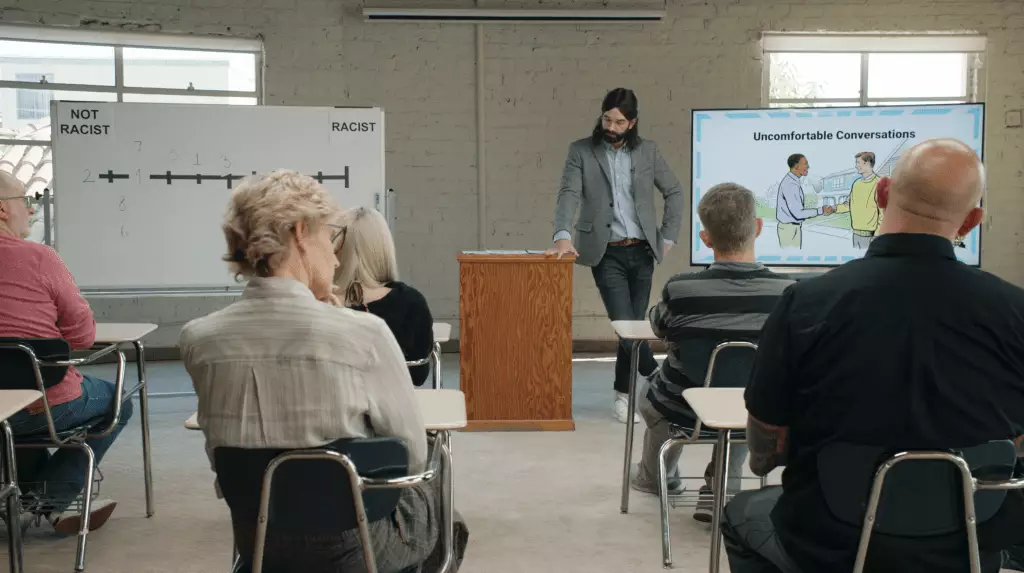Film is not just a form of entertainment; it serves as a mirror reflecting societal values, tensions, and changes. This past weekend’s box office results revealed intriguing trends, featuring a mixture of documentaries, faith-centered narratives, and avant-garde animation that cater to a diverse array of audiences. The performance of these films is indicative of broader cultural conversations around topics like diversity, inclusion, and the representation of faith in media.
One of the standout films at the box office was “Am I Racist?”, distributed by The Daily Wire, which grossed an impressive $4.75 million across 1,517 screens. This documentary, led by Matt Walsh, seeks to scrutinize diversity, equity, and inclusion (DEI) initiatives that have gained traction in various institutions. By taking an undercover approach clad in a tweed jacket and sporting a ponytail, Walsh embarks on a satirical journey that not only serves to question the validity of DEI practices but also attracts substantial attention from a conservative audience that feels represented.
The film’s 99% audience score on Rotten Tomatoes is a powerful testament to its resonance with viewers, although the absence of a critics’ score raises questions about its reception within more traditional film circles. This duality reflects a growing trend: the emergence of films that resonate powerfully with specific demographics while occasionally being dismissed or overlooked by mainstream critics. Additionally, the performance of “Am I Racist?”, strengthened by its nomination as one of the top documentary debuts of the past decade, illuminates a landscape where documentary filmmaking can align closely with political and ideological narratives.
Completing the top ten was “God’s Not Dead: In God We Trust,” which gathered a modest $1.46 million from 1,392 screens. As the fifth installment in the “God’s Not Dead” series, this film continues to explore the intersection of Christianity and politics, illustrating a growing demand for narratives that reflect faith-based perspectives in a secular world. Starring David A.R. White as Reverend David Hill, the film tackles political discourse surrounding faith, proposing that religion should remain integral to public policy.
The sustainability of such films cannot be ignored, particularly as they resonate well with audiences seeking affirmation of their values. Its impressive Rotten Tomatoes score of 98% among audience members reinforces a notion that faith-based films, when crafted with care, can cultivate not only box office success but a dedicated following.
On an entirely different note, anime has made significant strides in American cinemas as evident with the release of “DAN DA DAN: First Encounter.” Opening over $1 million from just 610 selected cinemas, the film created a notable wave among anime enthusiasts. The early debut of this series in theaters before its standard release highlights a changing strategy in how anime is marketed in the West, shifting from niche screenings to broader acceptance in mainstream film culture.
What sets “DAN DA DAN” apart is its inventive structure; it includes the initial episodes of the series along with behind-the-scenes interviews with the creative team. This hybrid approach caters to new fans and seasoned followers alike, marking a potential blueprint for future anime releases in North America. With an overwhelmingly positive audience reception reflected by a 99% score on Rotten Tomatoes, it’s clear that interest in anime is on the rise.
In the limited release arena, “My Old Ass,” directed by Megan Park, opened to a solid $171.2k at just seven theaters, exemplifying how indie films can make impactful debuts with limited resources. One might argue that the film’s focus on authentic storytelling and the use of recognized talents like Aubrey Plaza have positioned it for success as it prepares to expand into wider markets.
Indie films like “My Old Ass” highlight trends around unique narratives driven by personal storytelling. The strong reviews it has garnered, with a 92% fresh score from critics, foreshadow its potential for longevity in cinemas, supported by a promising word-of-mouth campaign.
The weekend’s box office reflects a cinematic environment growing increasingly polarized yet nuanced. Documentaries with an ideological edge, faith-driven narratives, and innovative approaches to anime underscore the varied landscape in which today’s films compete for audience attention. As these films attract fans from different walks of life, they stimulate important cultural dialogues, each in their unique way.
Cinema is indeed evolving, embracing a medley of perspectives that mirror the complexities of contemporary society. As filmmakers continue to navigate these dynamics, one can only anticipate how future releases will further shape the cinematic experience, pushing boundaries while fostering understanding across diverse audiences.

Leave a Reply